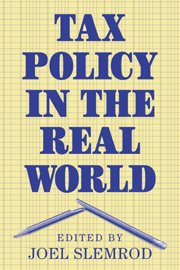Book contents
- Frontmatter
- Contents
- List of contributors
- 1 The real world of tax policy
- 2 Federal tax reform
- 3 Federalism and subfederal taxes
- 4 Principles, politics, and the professors
- Public finance in theory and practice
- On the use of ‘distribution tables’ in the tax policy process
- Taxation and economic growth
- Tax reform of the century – the Swedish experiment
- Measuring the impact of tax reform
- What is an ‘optimal’ tax system?
- How tax complexity and enforcement affect the equity and efficiency of the income tax
- Tax policy from a public choice perspective
- What is missed if we leave out collective choice in the analysis of taxation
- Public finance and public choice
- Professional opinions about tax policy: 1994 and 1934
- What can America learn from the British tax system?
- Peculiar institutions: a British perspective on tax policy in the United States
- Index
Professional opinions about tax policy: 1994 and 1934
Published online by Cambridge University Press: 01 June 2010
- Frontmatter
- Contents
- List of contributors
- 1 The real world of tax policy
- 2 Federal tax reform
- 3 Federalism and subfederal taxes
- 4 Principles, politics, and the professors
- Public finance in theory and practice
- On the use of ‘distribution tables’ in the tax policy process
- Taxation and economic growth
- Tax reform of the century – the Swedish experiment
- Measuring the impact of tax reform
- What is an ‘optimal’ tax system?
- How tax complexity and enforcement affect the equity and efficiency of the income tax
- Tax policy from a public choice perspective
- What is missed if we leave out collective choice in the analysis of taxation
- Public finance and public choice
- Professional opinions about tax policy: 1994 and 1934
- What can America learn from the British tax system?
- Peculiar institutions: a British perspective on tax policy in the United States
- Index
Summary
INTRODUCTION
Tax professionals are not inclined to replace the graduated income tax as the backbone of the federal tax system or abandon the property tax and sales tax as important features of the local and state revenue systems. They do, though, on average favor some significant reforms of the federal tax system, such as integration of the corporate and individual income tax, comprehensive inflation indexing, and elimination of the mortgage interest deduction. With regard to state and local taxes, a majority favor extending the sales tax to services, increasing reliance on user fees, and eliminating homestead exemptions from the property tax.
These are a few of the results of a tax policy opinion survey sent out on April 28, 1994 to the 1309 American and Canadian individual members of the National Tax Association (NTA). Of the 1309, 521 were academics, 406 were employed by a government or international agency, and 382 were in the private sector. There were 503 responses received before the cutoff date, representing an overall response rate of 38 percent, which is on the high side for mail surveys, especially ones for which there was no follow-up notice sent to those who did not respond promptly. The response rate was 45, 32, and 28 percent, respectively for academics, government, and the private sector. Although the response rate was relatively high, the nonresponse rate is certainly high enough to leave open the possibility that those who responded are not representative of the NTA membership.
- Type
- Chapter
- Information
- Tax Policy in the Real World , pp. 435 - 462Publisher: Cambridge University PressPrint publication year: 1999
- 4
- Cited by



